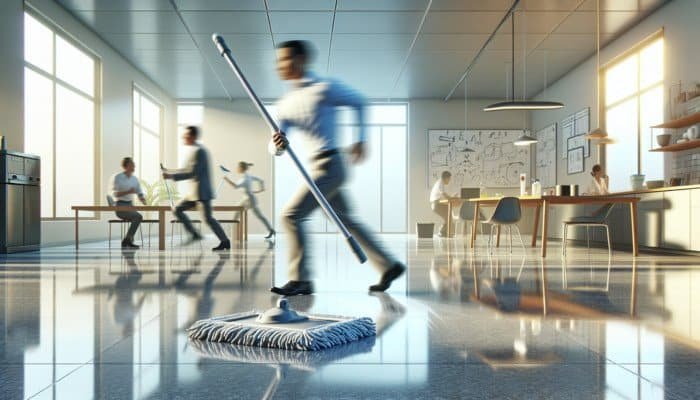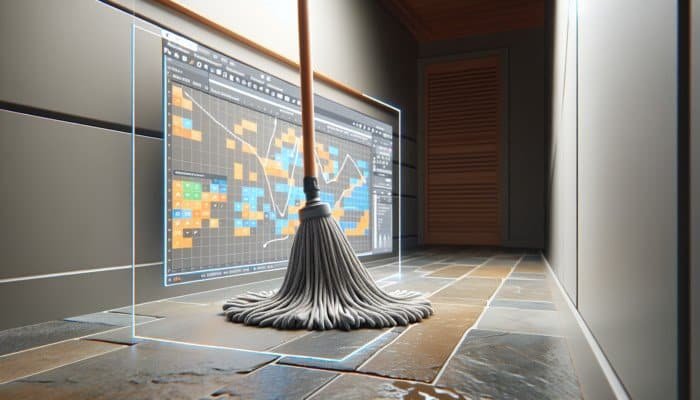


May 27, 2025 by
David Allen
Utilising a spray mop for stone floors offers many benefits that can completely transform your cleaning routine. These cutting-edge tools combine the convenience of mopping and spraying, significantly alleviating the demands of maintaining your floors while fostering a healthier home environment. In this comprehensive guide, we will delve into the essential advantages of employing a spray mop on stone floors, highlighting how they can boost your cleaning efficiency and extend the lifespan of your valuable flooring.

Maintaining the cleanliness of stone floors can often seem overwhelming, especially when relying on traditional mops and buckets. However, the entire cleaning process is streamlined with a spray mop for stone floors. The unique design of these mops enables you to spray your chosen cleaning solution directly onto the floor while simultaneously mopping. This dual functionality conserves time and minimises the physical exertion typically associated with mopping. Imagine effortlessly banishing dirt and grime without lugging a cumbersome bucket around or repeatedly rinsing your mop.
The practicality of spray mops is particularly beneficial in high-traffic homes or environments like cafés and restaurants, where cleanliness is crucial. Their ease of use allows anyone to operate them, from busy parents juggling household chores to employees in commercial settings maintaining strict hygiene standards. This user-friendly feature promotes more frequent cleaning routines, ultimately leading to a healthier living space for all occupants.
In today’s climate of heightened environmental awareness, spray mops for stone floors offer a more sustainable cleaning solution. Traditional mopping often necessitates using large quantities of cleaning chemicals, which can harm the environment and the integrity of your stone flooring. In contrast, spray mops utilise only a fraction of the cleaning solution, enabling more sustainable cleaning practices that are both effective and eco-friendly.
By minimising chemical usage, you contribute to preserving our planet and enhancing the longevity of your stone floors. Various stone types, such as limestone and marble, are sensitive to harsh chemicals, making a gentler cleaning approach essential. The capability to use less solution while still achieving a thorough clean represents a significant step toward adopting a responsible and conscientious cleaning regimen.
One of the standout features of spray mops for stone floors is their remarkable versatility. These mops suit various stone types, including granite, slate, and travertine. This adaptability makes them a wise investment for homeowners with diverse flooring throughout their residences.
Equipped with the appropriate cleaning solution, you can easily transition between different stone surfaces without worrying about causing damage. For example, a spray mop fitted with a soft microfiber head can effectively clean the delicate surfaces of polished marble while tackling the rugged texture of unsealed slate. This high level of versatility ensures that you can maintain the beauty and structural integrity of your stone floors without needing multiple cleaning tools, simplifying your cleaning arsenal significantly.

An often-overlooked advantage of using a spray mop for stone floors is its enhanced safety. Stone floors can become dangerously slippery when wet, increasing the likelihood of accidents. Spray mops allow for controlled moisture application, significantly reducing the risk of excess water on the floor while cleaning.
By carefully regulating the amount of cleaning solution dispensed, these mops contribute to a safer environment, particularly in homes with children or elderly family members. The risk of slips and falls is notably decreased, making spray mops an ideal choice for households prioritising safety and cleanliness. Incorporating such tools into your cleaning routine can offer peace of mind while effectively caring for your floors.
Efficiency is paramount in any cleaning endeavour, and spray mops for stone floors excel in delivering outstanding results. The direct application of cleaning solutions ensures even distribution, eliminating dirt and grime from every corner of your flooring. Unlike traditional mopping methods, which may leave streaks or overlooked areas, spray mops provide a consistently thorough clean.
Additionally, targeting specific areas with a concentrated spray allows for a more meticulous clean. This targeted approach is particularly advantageous in high-traffic zones, where dirt accumulates more. By ensuring that every inch of your flooring receives adequate attention, you can achieve a level of visually appealing cleanliness that contributes to the long-term durability of your stone floors.
Choosing the right spray mop for stone floors is paramount for achieving optimal cleaning results while safeguarding your precious flooring. With many options available, understanding the key features to consider can help streamline your decision-making process. This section will explore the essential factors to weigh when selecting a mop that meets your unique cleaning needs.

The design of the mop head is a crucial consideration when selecting a spray mop for stone floors. Choosing mop heads crafted from microfiber or soft pads is imperative to avoid scratching delicate stone surfaces. Microfiber is celebrated for its exceptional cleaning prowess, efficiently trapping dirt and dust without harming your flooring.
When evaluating mop heads, seek flexible designs that effortlessly reach corners and crevices, ensuring a thorough clean. Washing and reusing mop heads is another significant advantage, as it reduces waste and ongoing expenses linked to disposable pads. Investing in a high-quality mop head not only enhances your cleaning experience but also extends the lifespan of your mop.
One of the standout features to look for in a spray mop for stone floors is the inclusion of adjustable spray settings. Different stone varieties demand varying levels of moisture and cleaning solutions, so having the capability to personalise the spray intensity can significantly affect cleaning efficacy.
For instance, granite floors can withstand a more vigorous cleaning approach, while softer stones like limestone may necessitate a gentler application. Adjustable settings empower homeowners to customise their cleaning experience based on the unique requirements of their flooring, thereby preserving the stone’s integrity.
This versatility is especially beneficial in households with mixed flooring, allowing you to adapt your cleaning method without needing multiple tools. Such customisation is not merely a luxury; it is essential for maintaining the beauty and durability of your stone surfaces.
Durability is a fundamental quality when selecting a spray mop for stone floors. Given the demands of regular cleaning, opting for a mop with robust construction is vital to ensure it can withstand frequent use. Look for mops fashioned from high-quality materials that endure the wear and tear of cleaning stone floors.
Pay attention to the handle’s design as well; a sturdy, ergonomic handle can enhance comfort, making cleaning more enjoyable. A reliable and well-constructed mop will have a longer lifespan and facilitate improved cleaning outcomes, as you can apply the necessary pressure without worrying about the mop failing.
To safeguard the integrity of your stone floors, the spray mop for stone floors you choose must be compatible with pH-neutral cleaners. Many stone surfaces, particularly those with sealants, can be easily damaged by harsh chemicals, resulting in unsightly stains or surface etching.
Before purchasing a spray mop, ensure that it is designed to work seamlessly with pH-neutral, stone-safe cleaning solutions. This compatibility will not only protect your floors but also guarantee effective cleaning. Most brands recommend cleaning solutions, so adhere to these guidelines to maintain your mop’s performance and the beauty of your stone surfaces.
Selecting a cleaning solution is vital when utilising a spray mop for stone floors. The wrong type of cleaner can lead to damage, making it essential to understand which solutions will effectively clean without compromising the integrity of your floors. This section will explore the options available, empowering you to select the best cleaning products.
Opting for pH-neutral cleaners is essential to maintain the beauty of your stone floors. These cleaners are formulated to be gentle on stone surfaces while removing dirt and grime. The balanced pH helps prevent damage to the stone’s surface and any sealants in place.
When using a spray mop for stone floors, dilute the pH-neutral cleaner according to the manufacturer’s instructions for optimal results. Regular use of these cleaners can help preserve the stone’s natural sheen, keeping it looking pristine over time. Furthermore, pH-neutral products contribute to a healthier indoor environment, as these cleaners are often free from harsh chemicals and toxins.
Natural alternatives can be a compelling option for those who prefer eco-friendly cleaning methods when using a spray mop for stone floors. A simple mixture of vinegar and water can be an effective cleaning solution. However, using this sparingly is crucial, as vinegar’s acidic nature can etch certain types of stone, notably softer varieties such as limestone and marble.
When employing natural solutions, always test them on a small, inconspicuous area first to gauge their impact on your specific stone. This precaution helps ensure you don’t inadvertently damage your flooring. While natural cleaners can provide a sustainable cleaning route, always prioritise the longevity of your stone surfaces by using them judiciously.
When cleaning stone floors with a spray mop, it is crucial to avoid harsh chemicals. Substances such as bleach and ammonia can strip away protective sealants and damage the stone, resulting in costly repairs or replacements. It is vital to read labels carefully and steer clear of products not specifically formulated for stone.
Instead, concentrate on cleaners that are gentle yet effective for stone surfaces. Many manufacturers now provide a range of stone-specific cleaning products that successfully remove dirt without jeopardising the stone’s integrity. Investing in these specialised solutions will ensure your floors remain beautiful and well-maintained for years.
Employing effective cleaning techniques is essential to maximising the benefits of using a spray mop for stone floors. Understanding best practices will not only enhance your cleaning outcomes but also prolong the life of your flooring. This section will discuss key techniques to elevate your stone floor cleaning regimen.
Removing loose debris and dirt before mopping is vital. This step prevents scratches when dirt is ground into the stone during mopping. A high-quality broom or vacuum explicitly designed for hard floors is ideal, ensuring you effectively capture all dirt and particles.
In high-traffic areas, more frequent sweeping may be necessary to maintain cleanliness and protect the stone’s surface. Establish a cleaning routine incorporating regular sweeping, ideally before mopping, to adequately prepare the floor. This proactive approach enhances the effectiveness of your spray mop and preserves the beauty of your stone flooring over time.
The technique used while mopping is just as important as the tools and solutions you employ. When utilising a spray mop for stone floors, adopt a back-and-forth motion rather than a circular one. This method ensures even distribution of the cleaning solution while preventing excessive wear on the mop head and the flooring itself.
Employing a systematic approach will also help you cover all areas of the floor, ensuring thorough cleaning. Start from one corner of the room and work out, applying the cleaning solution as necessary. This technique optimises cleaning results and simplifies tracking areas that have already been cleaned.
After mopping, it’s crucial to allow the floor to dry completely. If moisture is allowed to linger, stone surfaces can be susceptible to water spots and mildew. Proper drying can be facilitated by ensuring good ventilation in the room, which helps expedite the process.
You might also consider using a dry mop or towel with your spray mop to absorb any excess moisture on stone floors. This additional step not only helps protect the stone but also enhances the overall cleanliness and appearance of the flooring. By prioritising drying, you can significantly reduce the likelihood of long-term damage to your stone floors.
Regular maintenance is vital to getting the most out of your spray mop for stone floors. Ensuring your mop remains in good condition will optimise its performance and enhance your cleaning routine. This section will provide key maintenance tips that can prolong the life of your mop and improve its overall effectiveness.
Over time, mop heads can accumulate dirt, grime, and bacteria, making it essential to clean them regularly. Depending on the material, many mop heads are machine washable, allowing easy maintenance. Routine washing removes build-up and ensures that your cleaning remains hygienic and efficient.
Make it a habit to wash the mop head after every few uses to maintain its effectiveness. Additionally, inspect the mop head for any signs of wear or damage. A well-maintained mop head will clean more efficiently and help preserve the quality of your stone floors, ensuring they remain beautiful for years to come.
The spray mechanism is a crucial component of your spray mop for stone floors, and ensuring it functions correctly is vital for optimal cleaning. Periodically check for clogs or malfunctions that could impede the spray function. A clogged sprayer can lead to uneven cleaning and unsatisfactory results.
If you notice any issues, consult the manufacturer’s instructions for troubleshooting or cleaning the spray nozzle. Keeping this component in good condition will enhance your cleaning efficiency and prolong the life of your mop, ensuring it performs at its best each time you use it.
Proper storage of your spray mop for stone floors is essential to prevent mould growth and ensure longevity. Store the mop in a dry, well-ventilated area to avoid dampness that can lead to unpleasant odours and bacterial growth.
Consider hanging the mop or storing it upright to prevent damage to the mop head. Avoid leaving the mop in areas with high humidity, such as bathrooms, where it can easily become a breeding ground for mould. Caring for your mop’s storage conditions allows you to extend its lifespan and ensure effective cleaning whenever needed.
As with any cleaning tool, regular inspection of your spray mop for stone floors for worn parts is essential. Pay close attention to components like the mop head and spray nozzles, which are critical for performance. If you notice wear or damage, replace these parts promptly to maintain optimal cleaning efficiency and results.
Many manufacturers offer replacement parts, making keeping your mop in top condition easy. A well-maintained mop will clean more effectively and help protect your stone floors from potential damage, ensuring that your investment pays off over time.
Always use the recommended cleaning solutions to maximise the effectiveness of your spray mop for stone floors. Using inappropriate cleaners can damage your floors and void any warranties. Stick to pH-neutral and stone-safe products to ensure the longevity of your flooring and the effectiveness of your cleaning tool.
By adhering to these maintenance tips, you can enjoy a more efficient cleaning experience while protecting the beauty and integrity of your stone floors for years to come.
While a spray mop for stone floors can significantly simplify your cleaning routine, inevitable common mistakes undermine your efforts. Understanding these pitfalls can help ensure optimal results while protecting your flooring. This section will outline the key mistakes to avoid, enabling you to refine your cleaning approach effectively.
Overwetting the surface is a critical mistake to avoid when using a spray mop for stone floors. Excess moisture can seep into the porous nature of specific stones, leading to potential damage, mould growth, and discolouration. When mopping, be mindful of the amount of cleaning solution dispensed; it’s essential to err on the side of caution to prevent oversaturation.
An adjustable spray setting can help control moisture levels, ensuring the floor remains damp but not drenched. It’s also crucial to allow adequate drying time after cleaning to minimise the risk of further damage. By being conscious of moisture levels, you can maintain the beauty and integrity of your stone floors over time, ensuring they remain a stunning feature of your home.
Using abrasive pads or brushes on stone floors is a common misstep that can cause irreversible damage. Scratching the surface can diminish the stone’s natural beauty and may lead to costly repairs. Always opt for soft or microfiber pads specifically designed for delicate surfaces when using your spray mop for stone floors.
Many modern spray mops come equipped with mop heads that are gentle on stone, allowing you to clean effectively without risk. Always double-check the manufacturer’s recommendations for compatible mop heads to ensure you make the safest choice for your flooring and preserve its integrity.
Every spray mop for stone floors has specific manufacturer guidelines outlining best practices for use and maintenance. Ignoring these recommendations can lead to subpar cleaning results or damage to your flooring. Take the time to read the user manual, paying close attention to details regarding compatible cleaning solutions, maintenance tips, and replacement parts.
By adhering to the manufacturer’s guidelines, you can maximise the performance of your spray mop while preserving the quality of your stone floors. This diligence not only enhances your cleaning efforts but also ensures the longevity of both your mop and your flooring investment.
Maintaining the pristine appearance of your stone floors goes beyond regular cleaning; it necessitates a commitment to proper care and maintenance. Using a spray mop can significantly enhance their look, but there are additional steps you can take to ensure that your flooring remains stunning for years to come. This section will discuss key practices to amplify the natural beauty of your stone surfaces.
Sealing your stone floors regularly is one of the most effective ways to protect and enhance their appearance. A high-quality sealant creates a barrier against stains, dirt, and moisture, helping to maintain the stone’s natural sheen. Different types of stone may require different sealing products, so selecting the appropriate sealant for your specific flooring is crucial.
Depending on the type of stone and the volume of foot traffic, sealants should typically be reapplied every few years. When applying sealant, ensure the floors are clean and dry to achieve optimal results. Regular sealing protects your stone and amplifies its visual appeal, ensuring it remains a focal point in your home for years.
The products you select for cleaning your stone floors can significantly impact their appearance. Using unsuitable cleaning solutions can lead to discolouration or damage to the stone’s surface. When using your spray mop for stone floors, stick to pH-neutral and stone-safe cleaning solutions to preserve their beauty and integrity.
Additionally, consider using products specifically designed for your type of stone. This tailored approach will ensure that you’re not only cleaning effectively but also protecting the longevity of your flooring. By being discerning about your cleaning products, you can maintain the vibrancy and allure of your stone surfaces over time, enhancing the overall aesthetic of your home.
Establishing a regular maintenance routine for your stone floors is key to keeping them looking their best. In addition to regular cleaning with your spray mop, incorporate periodic deep cleaning and inspections to assess the condition of your flooring.
Consider implementing a routine that includes sweeping, mopping, and sealing at scheduled intervals. This consistent approach will prevent dirt build-up and prolong the life of your stone. By dedicating time to regular maintenance, you can ensure that your stone floors continue to exude elegance and charm, reflecting the care you invest in them.
For those seeking to elevate the appearance of their stone floors further, enlisting professional cleaning services may be an excellent option. Professionals possess the expertise and tools necessary to restore and maintain the beauty of stone surfaces effectively.
Whether through deep cleaning, polishing, or resealing, professional services can provide care that may be difficult to achieve with DIY methods. If your stone floors have lost their lustre or show signs of significant wear, consider contacting experts to rejuvenate their appearance. This investment can yield remarkable results, leaving your floors looking as good as new and enhancing your home’s overall aesthetic appeal.
Spray mops are innovative cleaning tools that combine a mop with a spray mechanism. They enable users to dispense cleaning solution directly onto the floor while mopping. They offer convenience and efficiency for various floor types, including stone, making them popular among homeowners.
While spray mops are versatile, using the appropriate cleaning solution and mop head for your specific stone type is essential. Always consult the manufacturer’s recommendations for compatibility to ensure optimal cleaning results and prevent damage.
Stone floors should be cleaned with a spray mop regularly, ideally weekly. High-traffic areas may require frequent cleaning to maintain their appearance and hygiene, ensuring they remain inviting and pristine.
<pH-neutral cleaners are safe and effective for stone floors, as they won’t damage the surface or any protective sealant applied. Avoid harsh chemicals like bleach or ammonia, which can cause irreversible damage and diminish the beauty of your stone surfaces.
Regularly sweeping or vacuuming to remove debris before mopping can help prevent scratches. Additionally, using a soft microfiber mop head reduces the risk of damaging the stone surface, ensuring your floors remain beautiful and well-maintained.
Typically, stone floors should be sealed every one to three years, depending on the type of stone and the foot traffic they experience. Regular sealing enhances protection against stains and moisture, prolonging the life of your flooring.
You can create a natural cleaning solution using vinegar and water, but use it sparingly to prevent etching. Always test a small, inconspicuous area first to ensure safety and compatibility with your specific stone type.
Check for clogs in the spray nozzle and ensure the cleaning solution is diluted correctly according to the manufacturer’s instructions. If issues persist, refer to the manufacturer’s guidelines for troubleshooting specific problems and restoring proper function.
Steam mops can potentially harm certain types of stone, as the high heat may damage the surface or any sealant applied. For the safety and protection of your investment in stone flooring, it is best to stick to pH-neutral cleaning methods.
Regular cleaning with the right products and periodic professional polishing can significantly enhance the shine of your stone floors. Additionally, proper sealing will help maintain their lustre, ensuring they remain inviting and beautiful over time.